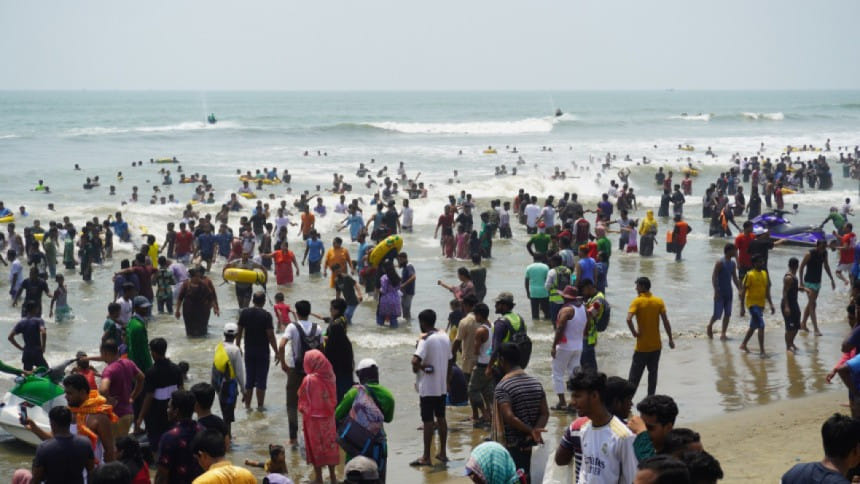When leisure turns lethal

We just came back from a trip to Lake Ohrid in North Macedonia. The boat driver was surprised by our over-insistence on wearing life jackets, despite the water appearing shallow and calm and the imported boat being highly reliable. We told him about the number of deaths by drowning over the last few days that had us concerned. The tragic end of two friends at a lake in Ontario, Canada, one being a seasoned pilot of a 787 Dreamliner in Bangladesh and the other a trailblazer in the sustainable textile industry, was fresh in our minds. Then there was the heartbreaking news of a father who died along with his teenage daughter while giving her swimming lessons in their village pond during the Eid holidays. And then there are people washed away by the treacherous waves at Cox's Bazar: six people in a day. Then came the big news of an Air India Boeing crashing in Ahmedabad soon after its takeoff. The plane slammed onto a medical hostel where some intern doctors were having lunch. Death visited them like a giant bird from the sky, carrying 242 passengers and crew with it.
Just when we thought a long holiday would give us a respite from everyday mayhem, sparing an opportunity for us to unwind and reconnect with our near and dear ones, these news reports of unrelated incidents reminded us of the dire threat of leisure turning lethal. With the benefits of hindsight, we can utter the ignored truth: some of these accidents were preventable.
The idea dawned on me while watching the disciplined driving during our trip to the Balkans. The number plates of the cars suggested that they have come from all over Europe. Yet, driving through the cliff-hugging narrow roads, they followed a particular protocol for overtaking. It was never like in our country, where a trail of vehicles are seen rushing together for lateral passing when there is no vehicle visible on the other side. The cars overtook one at a time, almost like the cyclists in the Tour de France. I think the combination of common sense and rule-abiding reduces the chances of accidents. Applying the same principle to the recent deaths makes sense.
The death of six tourists in Cox's Bazar over the Eid holidays would have been a national scandal in another country. The beaches would have been marked unsafe, and visitors would have been instructed to stay ashore. Here, our lack of common sense and defiance against safety directives stall any such initiative. Indeed, the authorities have marked some areas of the beach as danger zones. However, while thousands of people congregate in Cox's Bazar to enjoy the seaside sands, only a small number of them heed the warning signs. The lifeguards are posted on the designated beaches, and they don't have the manpower to patrol the longest natural beach in the world. According to a Prothom Alo report, 25 lifeguards and 25 beach workers, along with 70-80 tourist police officers, are deployed to oversee 100,000 tourists on a daily basis. The lack of institutional safeguards is further evident in the incident where two parasailers fell as their belts got unfastened. There is a complete lack of supervision. Vacationers unaware of the tricky water currents, hidden channels, and quicksand of the sandy shore often get overly enthusiastic and adventurous. In the absence of proper directives, implementation of rules, and common sense, tourists are left to rely on instinct, or worse, luck.
The Prothom Alo reports 49 deaths in the past six years. The actual number of deaths may be higher as many such incidents go unreported. We lament these deaths only when they get a human face through media. How do we justify that there is no sea netting system to curate a safe zone for swimming? The billion-dollar industry is operating independently. There is no collective strategy for inarguably the most famous tourist spot in Bangladesh. For instance, unplanned growth is visible by the presence of hotels on the beach itself, in a flagrant violation of rules. When those responsible for enforcing the rules violate them, we must be concerned about the general welfare of the location we wish to promote as a site of national significance. We can engage the hotel owners as stakeholders in the city's beautification and landscaping efforts. There are now 600 multistorey hotels and resorts that can share the cost of making the sea safe for their visitors.
The alarming number of deaths gives Cox's Bazar the bad press that no PR campaign can override. There is no comprehensive, year-round policy for beach safety. One can only hope that the Cox's Bazar authority will take steps that include the removal of unplanned structures, defining and securing swimming zones, mandatory safety briefings by tour operators, multilingual signage, and fully equipped emergency units stationed strategically along the coast. Treating beach safety as a national responsibility is crucial. Given the mismatch between the scale of the beach and the resources allocated, the integrated policy must engage the local stakeholders. Local community members should be engaged for beach patrol and rescue efforts. Digital apps can be used to inform beachgoers of conditions in real time. The hotels need to establish their emergency protocols.
The entire system must prioritise safety. There has to be coordination between first responders and the hospitals. We need a trained workforce that knows what to do when things go wrong. This will require a change in our attitude. As a nation, we have a tendency to ignore precautions as unnecessary or overcautious. People mock wearing life jackets on a boat as a sign of fear and breaking red flags at the beach as a sign of "bravery." Education, awareness campaigns, and the upholding of regulations can change this mindset. Otherwise, the same tragedies will continue to occur. Bangladesh, with its growing middle class and domestic tourism boom, must not wait for another tragedy to implement similar regulations.
Our policymakers must ensure a national audit of leisure-related deaths in the era of big data. The categories of location, activity and cause can help us determine the nature of an intervention and the requirements for tourist safety certification. Giving local leaders the autonomy to make decisions can streamline bureaucratic processes and bring decision-making closer to the issue at hand. The deaths of the father and daughter in Moulvibazar, for example, remind us of the need for basic CPR training at a community level. Swimming as a survival skill can be formally included in our curriculum as well.
The recent tragedies show that a person's death is only part of the story. The truth is, we could have prevented some of these deaths. Each story, whether from the sky, a foreign lake, a rural pond, or the roaring sea, tells that tale of our vulnerability. It reminds us of how much we have to lose and how little we often do to protect it.
Dr Shamsad Mortuza is professor of English at Dhaka University.
Views expressed in this article are the author's own.
Follow The Daily Star Opinion on Facebook for the latest opinions, commentaries and analyses by experts and professionals. To contribute your article or letter to The Daily Star Opinion, see our guidelines for submission.

 For all latest news, follow The Daily Star's Google News channel.
For all latest news, follow The Daily Star's Google News channel. 







Comments